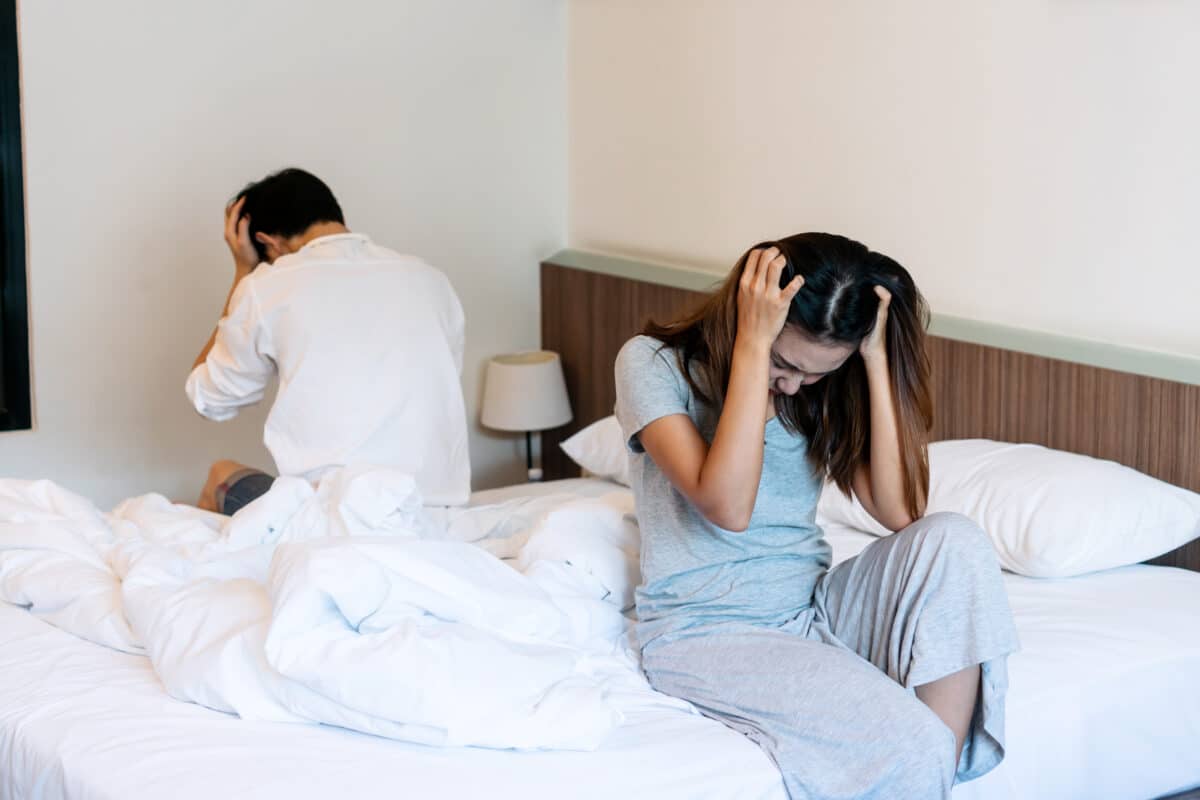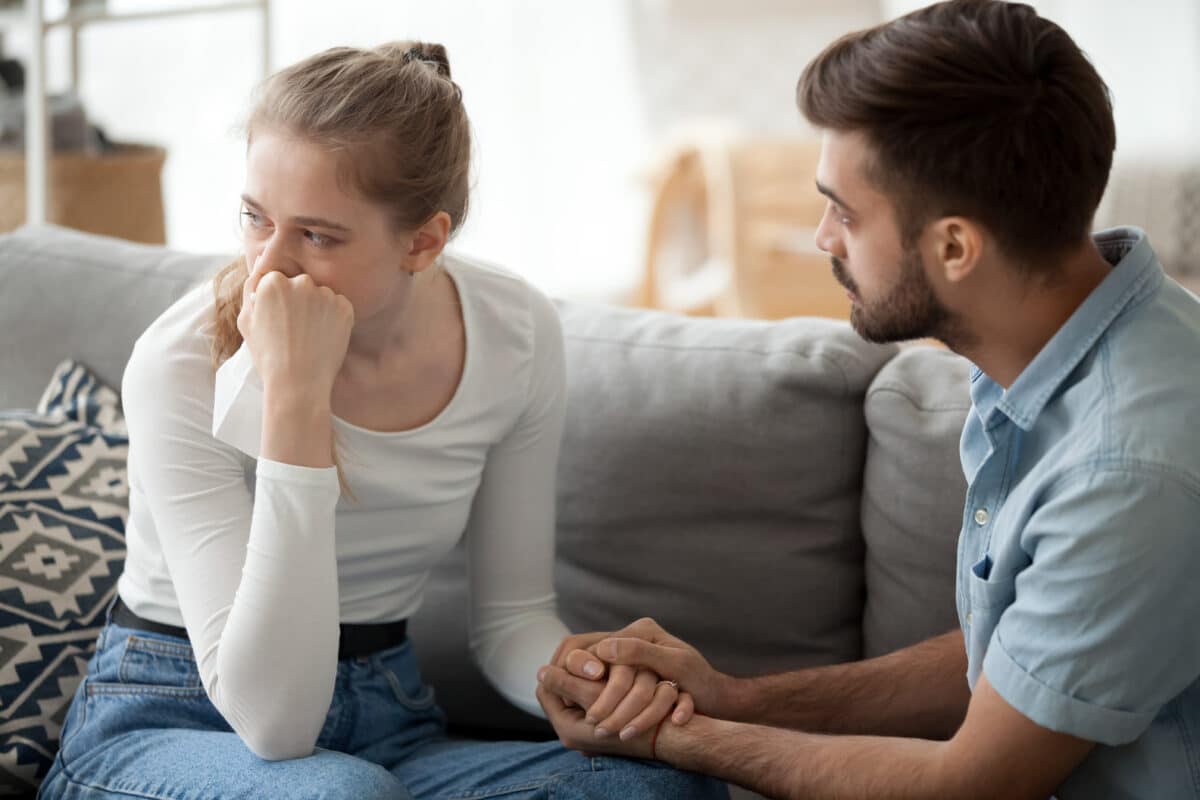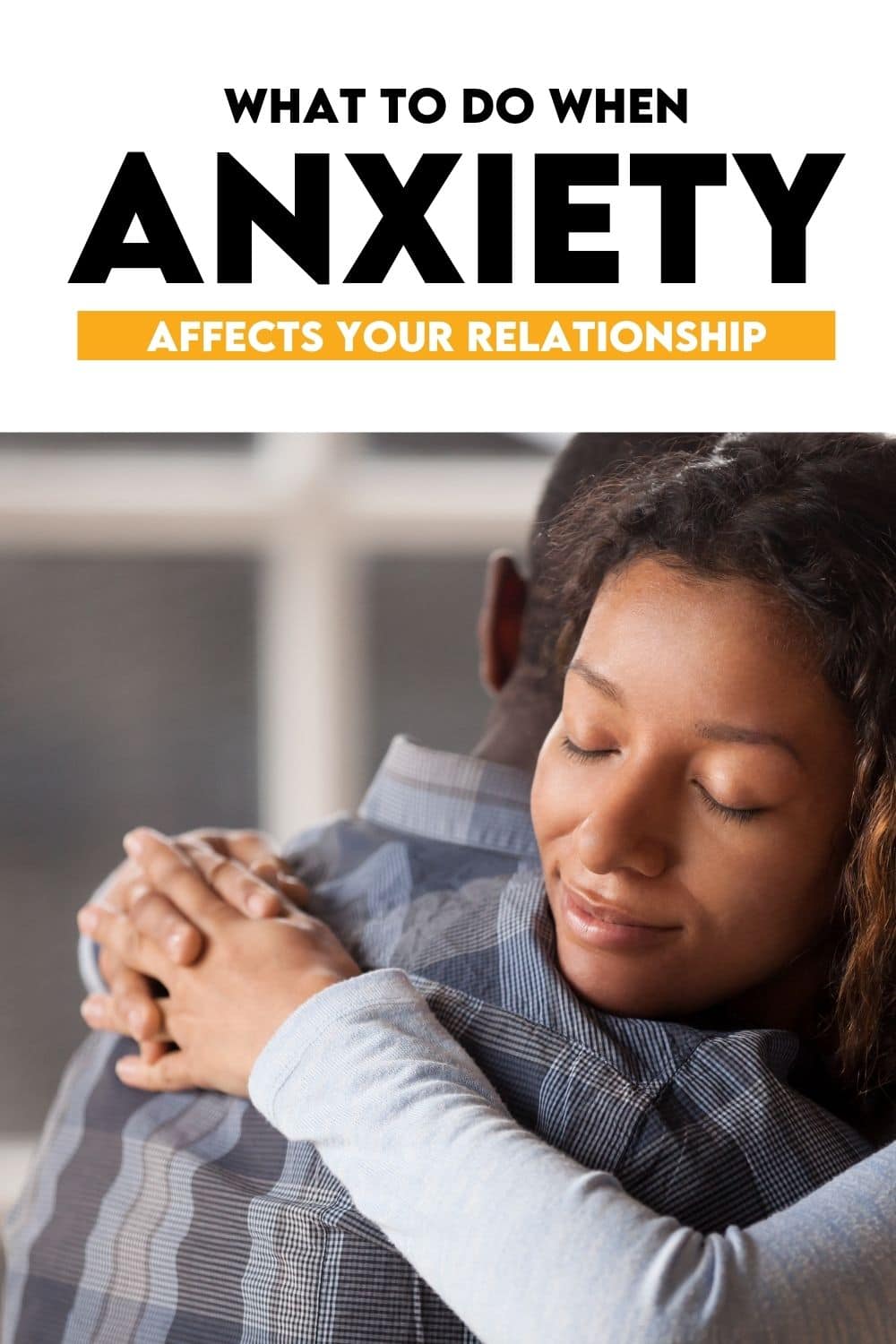Learn How to Deal with Anxiety
Are you in a struggling marriage, being pulled down by anxiety? You are not alone. Over 30% of people will struggle with anxiety at some time in their life. Sadly, anxiety and relationships are often not a good mix. Overthinking things can lead to a build-up of big emotions, the strain from which causes outbursts and arguments.

Break old patterns and begin working as a team to learn how to deal with anxiety as a couple. Whether it’s one or both of you dealing with anxiety or depression in marriage, it should be a team effort to regain control. We are here for you. In this post, we will address how anxiety affects relationships and how to deal with anxiety within your marriage.
It would be best if you learned how to take this challenge on as a team. Feeling fully supported can be the catalyst for real change. Rather than continuing to let your mental health drive a wedge between you and your spouse, use the tips below to improve your anxiety and relationships. So don’t give up and surrender to living in a struggling marriage forever; hope and healing are ahead!
How Anxiety Affects Relationships
Anxiety and depression in marriage cause disconnection and distance. Mental illness can be challenging to predict and even harder to understand. Each person is different, and their feelings, symptoms, and triggers can be complex and hard to explain. Those with mental illness will often try to protect those around them by hiding their struggles. Unfortunately, this can lead to further disconnect and eventually even bigger breakdowns.
Some people isolate themselves due to their anxiety, while on the other hand, there are people whose anxiety causes them to become overly dependent on their partner. This becomes an issue when extreme overthinking, fear of rejection, and the need for reassurance becomes excessive.

It is very common to feel isolated as you struggle with anxiety and depression. Feeling anxious is uncomfortable and difficult to describe fully. However, keeping it in or attempting to ignore it will only work for so long.
Anxiety can come from stress and trauma as a child, postpartum depression, emotional abuse, or no apparent cause. Regardless of its origin, negative ways of coping with anxiety erode relationships over time. This is why it is crucial to learn how to deal with anxiety in more productive ways.
6 Remedies for Anxiety in a Struggling Marriage
Mixing anxiety and relationships can be a recipe for disaster–but it doesn’t have to be. The deciding factor is the work you put into taking control of the anxiety and improving your connection. So take intentional steps to improve your mental health and your marriage–together.
Below are six ways to improve your anxiety and your marriage. The key to improvement is trying out these remedies together. The person with anxiety should not be expected to manage it alone, and the person without shouldn’t be stuck in a full-time support role. This is a team effort!
1. Find a Therapist.
It is so important to recognize that your partner is not a therapist and has not been professionally trained to know how to deal with your anxiety. Your partner can help support you, but they cannot “fix” you. Therefore, though you may feel frustrated by your spouse when you struggle to control your anxiety, you must remind yourself that they are not your therapist.
It would be best if you found a therapist that treats anxiety. Therapy can give you different coping strategies and perspectives on the stress you are feeling. If anxiety is taking over your relationship and leaving nothing but a struggling marriage in its wake, then couples therapy is a great next step.

2. Change Your Lifestyle.
With your spouse, identify areas where you can make goals to improve. For example, changing your diet in small but positive ways can have a powerful effect on your physical and mental health. In addition, find more ways to exercise and get your body moving. Movement is medicine for your body and mind. It can be challenging to get started, but the effects are proven to improve your mental health. Another great area for improvement is your sleep hygiene. What changes could you and your spouse make to get better sleep? More rest can do wonders for your mood.
Becoming proactive about your health and the ways you are caring for your body and mind will have noticeable effects. Continue to set goals and support each other in the positive changes you are making. Doing this together will not only hold you both accountable but will deepen your bond.
3. Adopt Relaxation Techniques.
Work with your spouse to identify what relaxation techniques work best for you. Researching methods for relaxing and then trying them out together can help you feel more equipped to deal with your anxiety. It can also help your spouse feel confident in dealing with your anxiety when it arises. Acting in unity to find coping strategies will ultimately benefit both of you.
Deep breathing, meditation, and yoga are all researched-backed relaxation techniques proven to help with anxiety. Find tutorials, courses, and classes and try them out! If none of these seem to be working, google more ideas for relaxation techniques and give them a try.

4. Be Proactive in Creating Positive Habits.
Take care of your mental health by taking care of yourself. If you treat yourself poorly, you are going to feel bad. How you talk to yourself and the words you use to describe yourself shape how you feel. If you are beating yourself up for struggling with anxiety, you are doing more harm than good.
Learn how to develop a habit of positive self-talk. Then, despite your shortcomings, you can create a happy, productive life. Work with your spouse to change your current practices and develop more self-confidence. Watch your life transform by changing your mindset to a more positive one.
5. Communicate.
This doesn’t mean just talking more. Instead, learn how to talk to each other in more productive ways. Acknowledge your discomfort, but eliminate the negative habits of explosive arguments. This is best achieved by having conversations about communication styles before you are in the heat of the moment. So when you are both calm, talk through the ways you would ideally communicate when your next anxious episode arises.
By expressing what makes you feel most supported and what you find to not be helpful in the moments of crisis, you will set yourselves up for more productive interactions in the future. In addition, communicating in a calm, positive way allows your partner to understand you and react better to your feelings and actions.

6. Make Time for Fun.
Get out of your head and have some fun! Setting aside time to connect with your spouse is so good for your marriage and your mental health! Whether you get out of the house or stay at-home, what matters is making time for each other. So don’t just sit side-by-side scrolling through your phones; make an effort to build your bond!
Anxiety has a way of creating a wedge between spouses. It can wedge between you so that it doesn’t allow either of you to really see each other anymore. Don’t let mental illness let you lose sight of the person you love. Instead, regain control by creating intentional moments of connection.

Figure out how to deal with anxiety affecting your marriage using these 6 remedies. Practice, practice, practice! All of these ideas take effort, but you can do it. Happier, healthier days are ahead!



